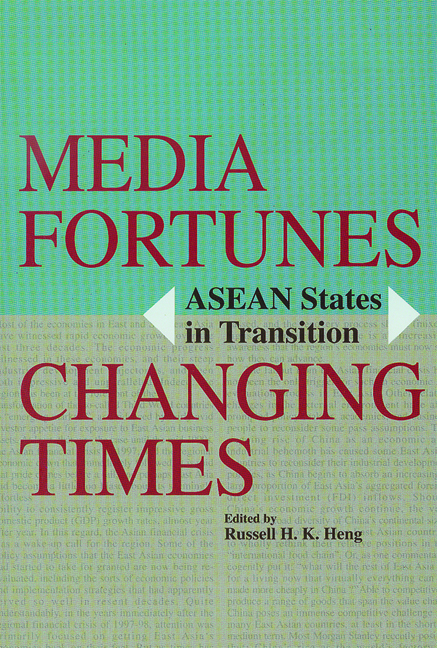Book contents
- Frontmatter
- Contents
- Foreword Wolfgang Möllers
- Acknowledgements
- Contributors
- Introduction
- Chapter 1 Media in Southeast Asia: A Literature Review of Post-1980 Developments
- Chapter 2 Cambodian Media in a Post-Socialist Situation
- Chapter 3 Industrialized Media in Democratizing Indonesia
- Chapter 4 Indonesian Television and the Dynamics of Transition
- Chapter 5 The Impact of Economic Transition on the Media in Laos
- Chapter 6 The Media and Malaysia's Reformasi Movement
- Chapter 7 Myanmar Media: Meeting Market Challenges in the Shadow of the State
- Chapter 8 Singapore: Media at the Mainstream and the Margins
- Chapter 9 Offending Images: Gender and Sexual Minorities, and State Control of the Media in Thailand
- Chapter 10 Vietnamese Media in Transition: The Boon, Curse, and Controversy of Market Economics
- Index
Chapter 6 - The Media and Malaysia's Reformasi Movement
Published online by Cambridge University Press: 03 November 2017
- Frontmatter
- Contents
- Foreword Wolfgang Möllers
- Acknowledgements
- Contributors
- Introduction
- Chapter 1 Media in Southeast Asia: A Literature Review of Post-1980 Developments
- Chapter 2 Cambodian Media in a Post-Socialist Situation
- Chapter 3 Industrialized Media in Democratizing Indonesia
- Chapter 4 Indonesian Television and the Dynamics of Transition
- Chapter 5 The Impact of Economic Transition on the Media in Laos
- Chapter 6 The Media and Malaysia's Reformasi Movement
- Chapter 7 Myanmar Media: Meeting Market Challenges in the Shadow of the State
- Chapter 8 Singapore: Media at the Mainstream and the Margins
- Chapter 9 Offending Images: Gender and Sexual Minorities, and State Control of the Media in Thailand
- Chapter 10 Vietnamese Media in Transition: The Boon, Curse, and Controversy of Market Economics
- Index
Summary
INTRODUCTION
The economic and political crises besetting the region as a consequence of the “Asian meltdown” in the late 1990s has seen the emergence of new groups and new demands among the peoples of numerous ASEAN countries. The majority of these demands are related to an apparent desire to reform woefully outdated systems of governance and to make governments and corporations in the region more transparent, accountable and democratic.
The media, as has often enough been acknowledged, play a pivotal role in defining social consciousness. Aware of this crucial role, governments and large corporations all over the world have been quick to attain control of the media through a variety of means, in order to enable the media to work in tandem with their needs and motivations.
By looking at this relationship between the media, the state and commercial interests in the context of Malaysia, this chapter attempts to locate the role played by the mainstream media during this period of transition. The principal aim is to provide a preliminary assessment of what the Malaysian Reformasi movement asserts itself to be and how the movement has thus far been depicted by the mainstream media. This study confines itself to a qualitative analysis of the mainstream Malay and English-language media, principally the print and broadcast media.
THE REFORMASI MOVEMENT: OLD ISSUES, NEW CONVERTS
In the heady days of late 1998, the streets of Malaysia's capital, Kuala Lumpur, reverberated with chants of R-E-F-O-R-M-A-S-I. Thousands of demonstrators took to the streets almost weekly, demanding changes, including justice (especially for Anwar Ibrahim, the sacked former Malaysian deputy prime minister, who was later detained, beaten up by Malaysia's top policeman, charged in court, and, predictably, convicted and sentenced to 15 years incarceration), greater transparency and accountability on the part of the government of the day. More personally, many urged Prime Minister Mahathir Mohamad to resign.
It was, to borrow from Charles Dickens, the best of times and the worst of times. The Asian economic crisis, which began in mid-1997, had started biting the Malaysian economy. Many businesses were facing bankruptcy while other, more privileged ones were being bailed out by the regime. Words like “transparency” and “accountability” were being bandied about by the likes of the IMF (International Monetary Fund) and the World Bank, and were becoming popular among Malaysian citizens.
- Type
- Chapter
- Information
- Media Fortunes, Changing TimesASEAN States in Transition, pp. 119 - 138Publisher: ISEAS–Yusof Ishak InstitutePrint publication year: 2002

